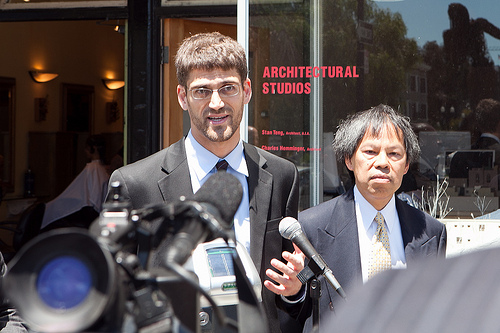This is the fourth part in Streetsblog’s series profiling 11 officials who are bringing American cities and towns into the 21st century when it comes to transportation and planning policy. Read the earlier profiles in part one, part two, and part three.
Jay Primus
Manager, SFMTA's SFPark program

In your average city, parking policy is pretty rigid: The parking meters have their rates, and the rates don't change, no matter how much cruising and double-parking results from prices that don't reflect demand for curbside space.
That's not how things work in San Francisco. For the last few years, the SFMTA has been rolling out a groundbreaking program called SFPark, which recognizes that curbside parking is a scarce good and should be priced in response to demand. Headed up by Jay Primus, SFPark could be the model for parking policy that cities all over the country seek to emulate.
Applying the theories of UCLA professor Donald Shoup, SFPark promises to reduce cruising and double-parking by adjusting prices and distributing information, so that drivers find available spaces quickly instead of searching fruitlessly ad nauseam. It's called "dynamic parking," and it adds a whole new level of sophistication and intelligence to parking policy -- not to mention a mountain of data.
Overseeing the interpretation of and response to all this data is Primus. Managing the parking data -- not to mention the public communications challenge that comes with an overhaul of parking prices -- is a big job. Primus has been hard at work at it now for three years.
There have been bumps, and as one would expect, some backlash when the program has expanded into areas that currently don't have meters. Encouragingly, the rollout has gone smoothly in areas that already have meters. Primus himself has said it is too soon to judge the effect of the program.
But there's no disputing that Primus is leading San Francisco to a new frontier of parking policy. And the lessons learned from SFPark will prove valuable for cities everywhere.
Rina Cutler
Philadelphia Public Works Director

Rina Cutler has a big job. As Philadelphia's Deputy Mayor for Transportation and Public Utilities, Cutler not only leads the streets department, but also the water department and the airport.
Cutler has proven she can do all three of those jobs and help lead Philadelphia in a new, more sustainable direction. Formerly the Philadelphia regional manager at Ed Rendell's PennDOT, Cutler has made waves with her "Green City, Clean Waters" program, which manages stormwater using porous pavement and sophisticated landscaping techniques. The concept has since been adopted by other cities including Portland and Cleveland.
Meanwhile, Cutler has also supported the growth of Philadelphia's underappreciated bike network. The bike scene in Philly is growing robust: According to a study by the Bicycle Coalition of Greater Philadelphia, more than two percent of Philly commuters get to work by bike, a higher share than New York or Chicago. Cutler has been helping to advance this trend by fighting some tough battles to put bike lanes on major thoroughfares.
According to Bike Coalition Director Alex Doty, Cutler's collaborative style is helping to move the city forward at a steady clip. Recently, a traffic survey found that 20 percent of the total vehicle throughput on 13th Street -- one of the city's seven buffered bike lanes -- was bicycles. And because Cutler makes such a point of generating consensus, Doty is convinced the improvements have real staying power.
"Rina would never call herself a politician. She’s just very good with people," said Doty. "She can also cut to the chase and make decisions. She’s a very capable administrator in terms of getting change within her department, but also the people she works with just really feel like she’s got their back."





